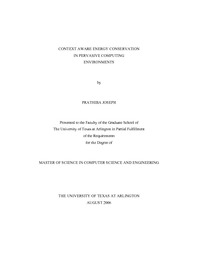
ATTENTION: The works hosted here are being migrated to a new repository that will consolidate resources, improve discoverability, and better show UTA's research impact on the global community. We will update authors as the migration progresses. Please see MavMatrix for more information.
Show simple item record
| dc.contributor.author | Joseph, Prathiba | en_US |
| dc.date.accessioned | 2007-08-23T01:56:46Z | |
| dc.date.available | 2007-08-23T01:56:46Z | |
| dc.date.issued | 2007-08-23T01:56:46Z | |
| dc.date.submitted | August 2006 | en_US |
| dc.identifier.other | DISS-1401 | en_US |
| dc.identifier.uri | http://hdl.handle.net/10106/450 | |
| dc.description.abstract | Extending battery lifetime is one of the most critical and challenging problems in mobile systems. When the mobile device sounds a low battery alarm, the user is given an ultimatum to quickly find a power source or suspend work. The greatest utility of mobile devices is their ability to be used anywhere, and at anytime. But power limitations of these devices seem to hinder this goal. The ever-growing needs of mobile users for increased lifetime of wireless devices imply that emerging wireless systems must be more energy-efficient than ever before.
Cyber foraging or remote resource exploitation may be an efficient way to deal with this problem in a pervasive computing environment. Mobile devices can save battery power by migrating tasks to a nearby wired infrastructure or to other wireless devices in the environment with higher battery capacity and processing power. However, this process requires considerable automation to minimize energy consumption and user distraction. Also, a pervasive computing environment is highly dynamic and the contexts in the environment change rapidly as devices enter and leave the network. Thus, it is important that the devices are aware of the changing context and adapt to these changes accordingly. This leads to the challenge of how the devices would detect these changes and secondly how they would adapt to these changes after they are detected.
A middleware service framework has been developed and deployed over a network of machines that exploit remote resources. The framework adopts a context-aware approach to make intelligent decisions on task migration. It uses the achievable throughput in an end-to-end path as the context. The throughput achievable to each of the remote devices is measured and stored, and this is used to examine the trade-off between communication power expenditures and the power cost of local processing.
For a set of tasks, energy savings of up to 43% are achieved through this process of context aware energy conservation. | en_US |
| dc.description.sponsorship | Kumar, Mohan | en_US |
| dc.language.iso | EN | en_US |
| dc.publisher | Computer Science & Engineering | en_US |
| dc.title | Context Aware Energy Conservation In Pervasive Computing Environments | en_US |
| dc.type | M.S. | en_US |
| dc.contributor.committeeChair | Kumar, Mohan | en_US |
| dc.degree.department | Computer Science & Engineering | en_US |
| dc.degree.discipline | Computer Science & Engineering | en_US |
| dc.degree.grantor | University of Texas at Arlington | en_US |
| dc.degree.level | masters | en_US |
| dc.degree.name | M.S. | en_US |
| dc.identifier.externalLink | https://www.uta.edu/ra/real/editprofile.php?onlyview=1&pid=194 | |
| dc.identifier.externalLinkDescription | Link to Research Profiles | |
Files in this item
- Name:
- umi-uta-1401.pdf
- Size:
- 521.1Kb
- Format:
- PDF
This item appears in the following Collection(s)
Show simple item record


